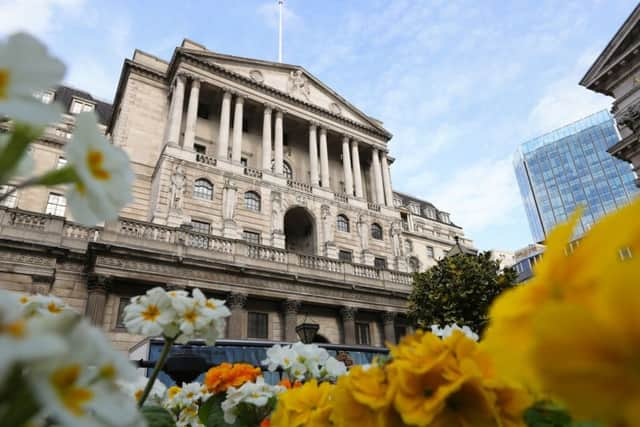Why cutting interest rates makes no economic sense at this time – Ros Altmann


Rates are already at emergency levels, having been stuck close to zero and well below inflation for over 10 years. The usual rationale for lowering rates is to revive growth during an economic slowdown, or to anticipate future weakness if leading indicators have weakened.
But the UK economy has been showing clear signs of recovery after pre-election weakness.
Advertisement
Hide AdAdvertisement
Hide AdPre-election fears have given way to positive economic indicators: With the emphatic Conservative general election victory, prior fears of a Marxist Labour government in charge of the economy and possible imminent No Deal Brexit have disappeared.


Those uncertainties had obviously held back spending and investment, but UK capital markets, economic indicators and house prices have recovered well
since mid-December.
Monetary policy should not be backward-looking: Cutting rates would mean policy-makers responding to lagging indicators that represent circumstances which have fundamentally changed.


Advertisement
Hide AdAdvertisement
Hide AdNormally, monetary policy should be prudently set to reflect future developments. Of course, it is possible that leaving the EU will see further uncertainties later this year, but it is far too early to predict this now – and indeed policy is already extremely accommodative.
‘Money-Tree Policy’ is like easing fiscal policy without political accountability: I do fear that the Bank of England’s monetary policy (‘Money-Tree Policy’) is storing up problems for the future.
Quantitative Easing (money-printing by another name) was a huge monetary experiment, designed as an emergency boost when the debt bubbles caused by irresponsible lending burst. It was never meant as a permanent reflation mechanism once the emergency economic situation has passed.
Advertisement
Hide AdAdvertisement
Hide AdIt has benefited the most powerful groups and the wealthiest citizens. Policymakers, governments and financial markets have benefited enormously from this policy and may have become ‘addicted’ to ongoing easing.
In the meantime, ordinary households face rising risks and rising debts: The vast majority of savers hold their savings in cash, not in assets. If the Bank of England lowers rates, it will be inflicting further pain on savers, especially those outside the wealthiest 20 per cent of the country.
Even cheaper mortgages are not necessarily good for the economy: An oft-cited benefit of lower interest rates is the boost for mortgage borrowers. But this is not an unalloyed positive. Yes, mortgage rates have fallen, but house prices have risen sharply so that new purchasers must borrow more to be able to get on the housing ladder.
Overall, the cost of servicing mortgages has fallen for those who already owned their own home. Around two-thirds of UK households own their own home, with 4.5 million households (mostly the older generations) having no mortgage.
Advertisement
Hide AdAdvertisement
Hide AdThere are 11 million households with an outstanding mortgage and they might benefit from lower mortgage interest rates, but they are not the majority of the population.
Credit card and overdraft rates have risen: Even though interest rates have fallen, credit card interest rates reached a record high last month and the FCA’s latest brainwave for helping customers with unauthorised overdrafts has seen punitive increases in costs of arranged overdrafts for the more responsible customers.
In addition, more retailers are encouraging people into buy now pay later purchases, which are leading to rising debt problems. Retailers have started to become credit companies, with significantly increasing proportions of their profits coming from consumer loans.
I fear that central banks have not recognised the risks their policies entail: Just reducing rates, when they are already so low, is not necessarily a benefit to the economy.
Advertisement
Hide AdAdvertisement
Hide AdYes, it can help banks and lenders who increase or maintain their margins, but savers, pension funds and ordinary households may well be worse off. I urge the Bank of England not to cut rates this week.
Baroness Ros Altmann is a Tory peer and former Pensions Minister.